
Module 4:
Vaping & Mental Health: A Colliding Crisis
While plenty of research shows that nicotine harms the developing brain, we still do not know as much about the connection between nicotine and mental health.
Click on the infographics below to learn more about how vaping nicotine can actually worsen symptoms of depression, anxiety, and difficulty concentrating.
Fact 1
Fact 2
Fact 3
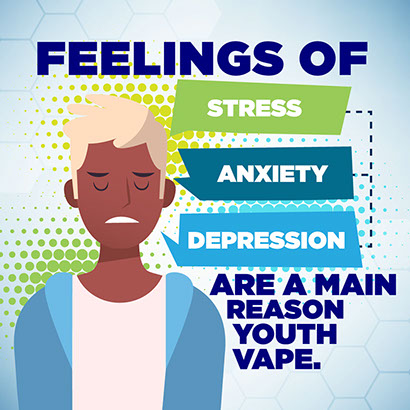
Even though feelings of stress, anxiety, and depression are a main reason youth may vape, most youth believe they would feel better about themselves if they quit.
In fact, 80% of youth who do quit vaping, report feeling having better control over their anxiety and managing their stress.
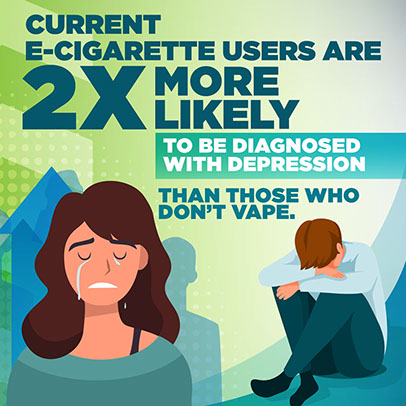
Research has shown for a long time an association between combustible cigarette smoking and depression. Exposure to nicotine over a long period of time, or frequent use of nicotine disrupts the dopamine pathway and increases sensitivity to stress.
Nicotine also distorts the body’s natural coping mechanisms that buffer against depressive symptoms, so it makes sense there could be a connection between vaping and depression since many e-cigarettes and vapes contain nicotine.
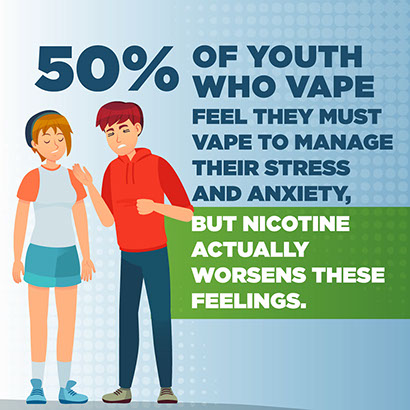
Based on the results of a large study of ninth graders who had never previously used e-cigarettes or combustible tobacco found that those who used e-cigarettes at a higher frequency were associated with higher depressive symptoms. This also included feeling sad or having crying spells a year later.
You can read the past 50 years of research on the health consequences of smoking and how nicotine harms the developing brain here.
ADDICTION
With the way e-cigarettes are made today, the chance for becoming addicted is even higher. Chemicals like nicotine are not only toxic to the body but toxic for the brain because it’s highly addictive. Young people can start showing signs of nicotine addiction quickly, sometimes even before they start vaping daily. For young people, addiction can interfere with school, relationships, and activities they enjoy. It can affect their ability to learn, pay attention, and control their moods.
It doesn't matter if a young person vapes socially or daily, the body can build up a tolerance for nicotine and trick the brain into thinking it needs the drug in order to function. Teens who become addicted are at a higher risk of brain damage and are also more likely to become addicted to other drugs.
Take a look at what some Say What! Teen Ambassadors are saying about vaping and their thoughts on addiction.
NEW VAPES AND SCREEN TIME
Vaping not only harms your body, but with rapidly evolving devices, new disposables pose potential risks to the brain as well. In Module 2, we discussed devices with screens and built-in games as a new strategy to target youth. These devices raise serious concerns for the developing brain, as they can increase screen addiction and nicotine addiction at the same time. Some disposables even incorporate games that require users to vape or "take a hit" to advance to the next level. These newer devices often contain higher nicotine concentrations and deliver more puffs compared to traditional cigarettes.

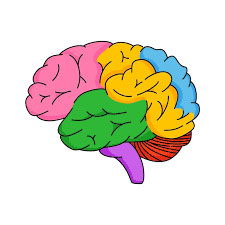
SLEEP
Vaping nicotine can also negatively affect a crucial part of a young person’s daily routine—sleep. Sleep is important for all ages because it's when your body repairs itself and grows. However, studies show that regular vaping can disrupt sleep patterns, leading to restlessness, bad dreams, and fatigue.
During sleep, your body and brain go through different stages, including light sleep (N2) and deep sleep (N3). Vaping can interfere with these stages, making it harder to get the rest you need. In some cases, vaping can even cause symptoms of insomnia, a sleep disorder that makes it difficult to fall asleep and stay asleep.
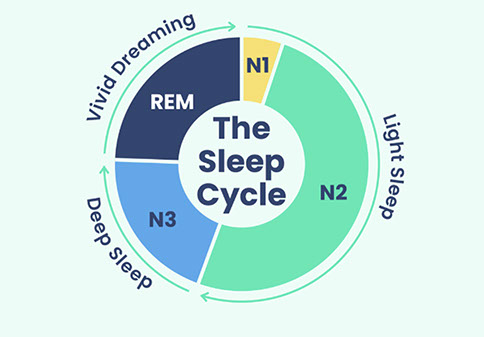
Vaping affects both your body and mind. Knowing these risks can help you make better choices for your health.
Sources for module 4 include Texas Department of State Health Services, Truth Initiative, the Journal of American Medical Association, Centers for Disease Control & Prevention, and the New Medical Life Sciences.
Training Module
Modules
Home
Say What! EST. 2011
Phone
512.245.8082
Mailing Address
Texas School Safety Center
ATTN: Say What Program
Texas State University
601 University Drive
San Marcos, TX 78666

Say What! was created and designed by young people from across Texas and connects students interested in eliminating tobacco from their schools and communities. The Say What! movement is funded by the Texas Department of State Health Services through a contract with the Texas School Safety Center at Texas State University.

